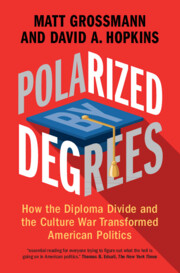Book contents
- Frontmatter
- Dedication
- Contents
- Inspiration and Acknowledgments
- 1 Introduction: Changing Parties in a Changing World
- 2 How Educated Liberals Are Winning the Culture War
- 3 “Hope and Change” Meets “Make America Great Again”
- 4 The Rise of the Diploma Divide in American Elections
- 5 Trust the Institutions, or Burn Them Down?
- 6 Fighting “Woke Capitalism”: The Republican Rebellion against Corporate America
- 7 Are Policymakers Solving Problems or Imposing Values?
- 8 Conclusion: Why Everything Is about Politics Now, and Politics Is about Everything
- List of Figures
- Notes
- Index
7 - Are Policymakers Solving Problems or Imposing Values?
Published online by Cambridge University Press: 05 September 2024
- Frontmatter
- Dedication
- Contents
- Inspiration and Acknowledgments
- 1 Introduction: Changing Parties in a Changing World
- 2 How Educated Liberals Are Winning the Culture War
- 3 “Hope and Change” Meets “Make America Great Again”
- 4 The Rise of the Diploma Divide in American Elections
- 5 Trust the Institutions, or Burn Them Down?
- 6 Fighting “Woke Capitalism”: The Republican Rebellion against Corporate America
- 7 Are Policymakers Solving Problems or Imposing Values?
- 8 Conclusion: Why Everything Is about Politics Now, and Politics Is about Everything
- List of Figures
- Notes
- Index
Summary
Democrats prize experts in staffing the Executive Branch while Republicans prefer political operatives and media spokespersons. But across the issue spectrum, policies are increasingly complicated and technical, requiring knowledge of many previous rounds of institution-building and policymaking. New social problems require remixing of complex policy tools, often led by research and experts. Addressing climate change and public health, for example, requires professionalized expert workforces and technical analyses. Even seemingly value-based areas of policymaking such as economic development and racial discrimination increasingly require subject-matter experts and formalized training. And the issue of higher education itself has increasingly divided the parties. Chapter 6 documents how each policy area is increasingly dominated by complex proposals from liberals accompanied by conservative suspicion of expert-led governance. Policy knowledge and evaluation capacity have become increasingly tethered to the Democratic Party, with believably nonpartisan expertise now in short supply.
Keywords
- Type
- Chapter
- Information
- Polarized by DegreesHow the Diploma Divide and the Culture War Transformed American Politics, pp. 241 - 278Publisher: Cambridge University PressPrint publication year: 2024

